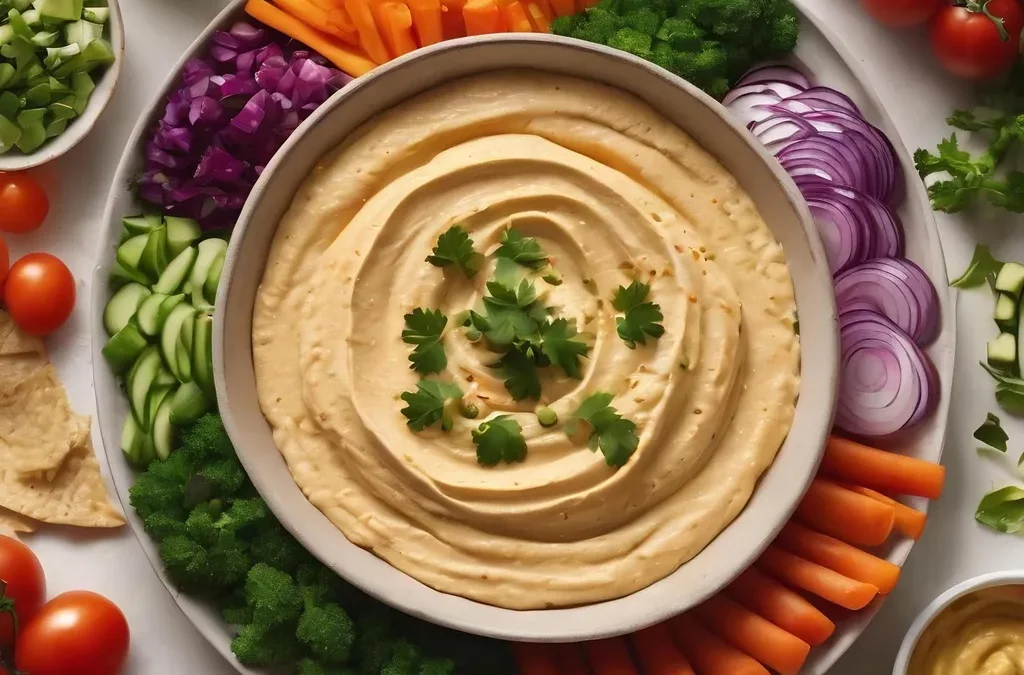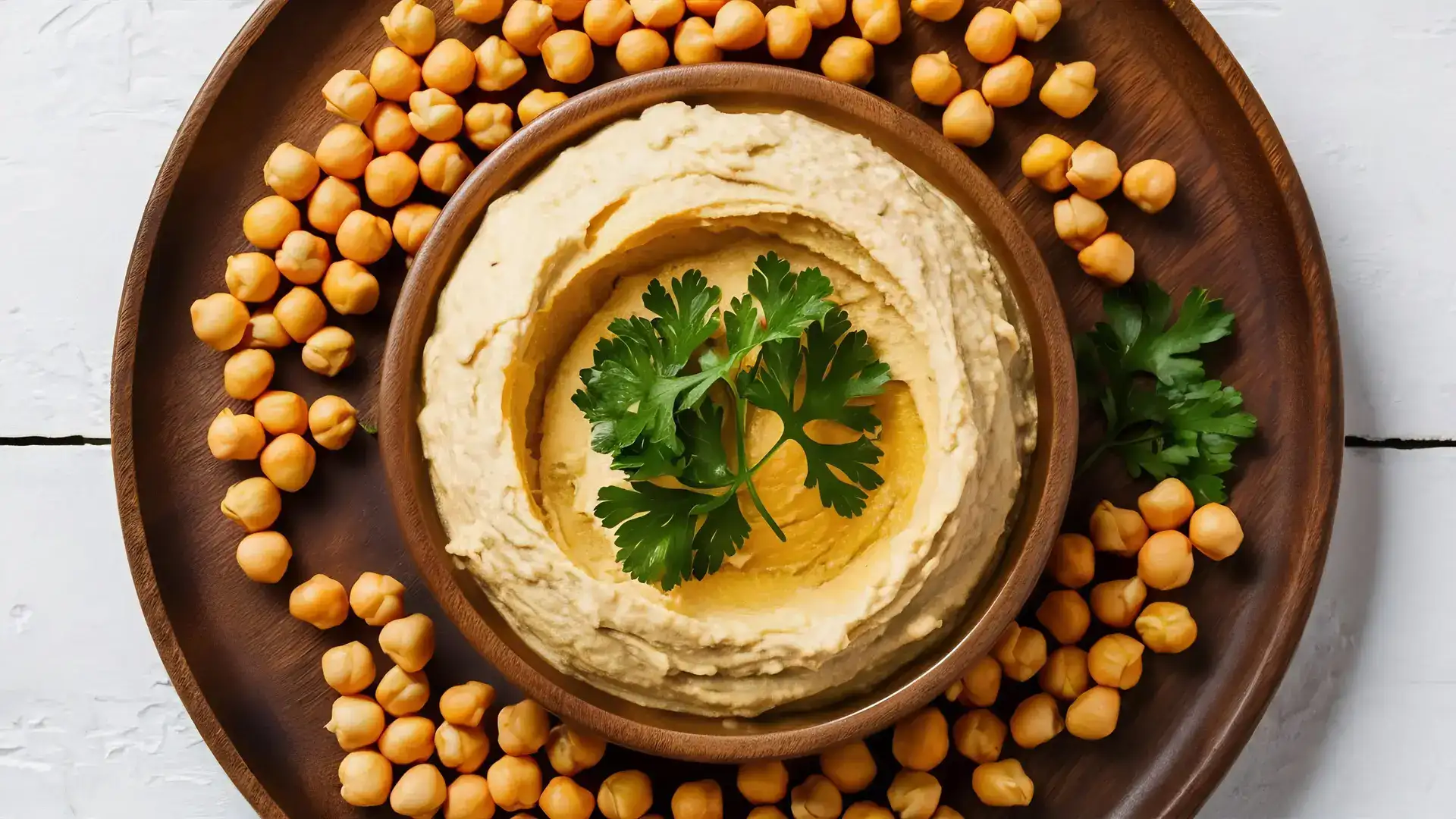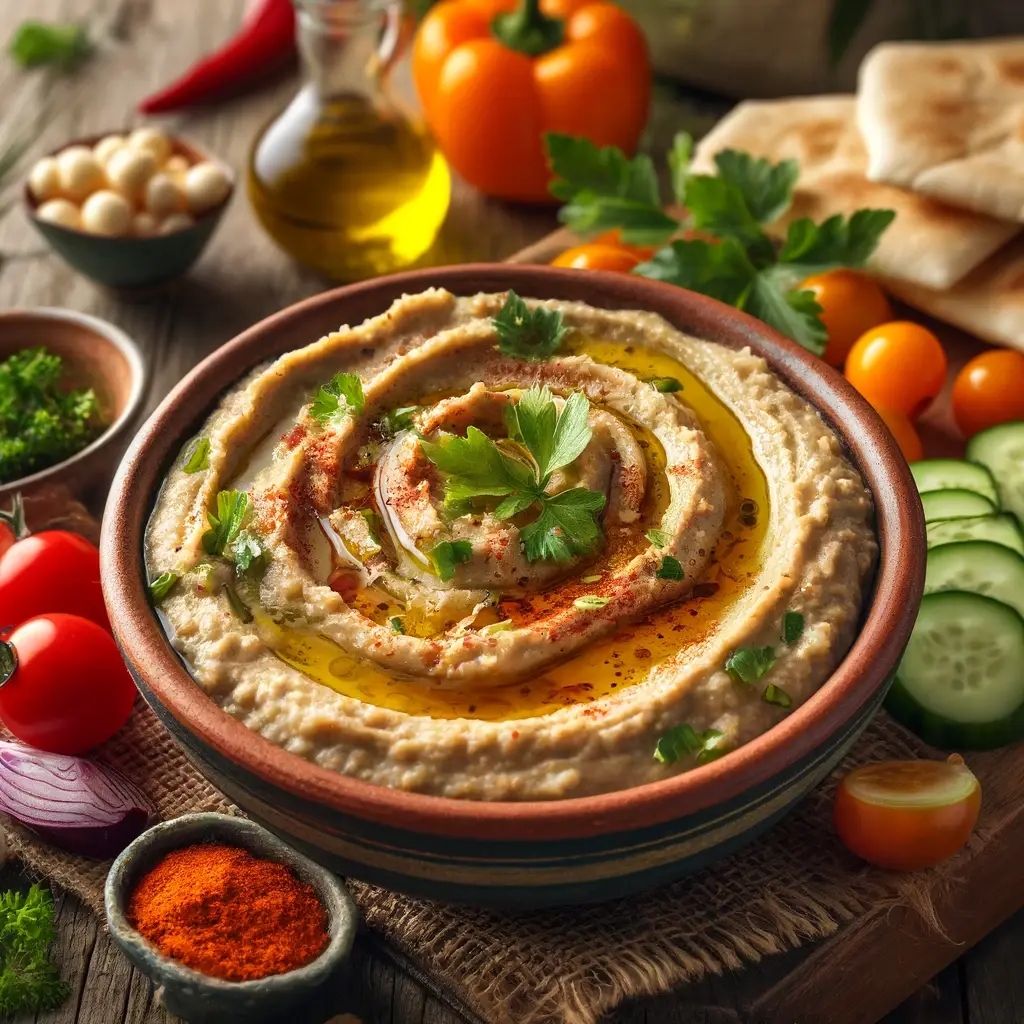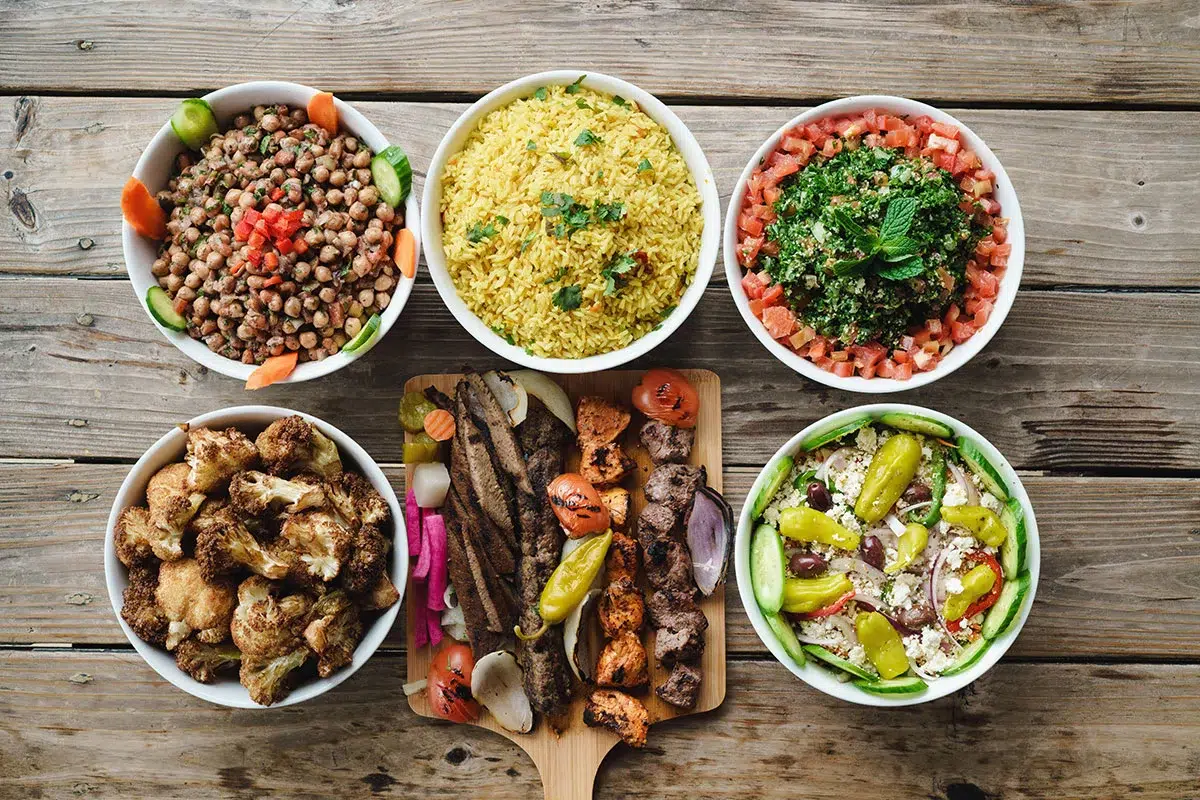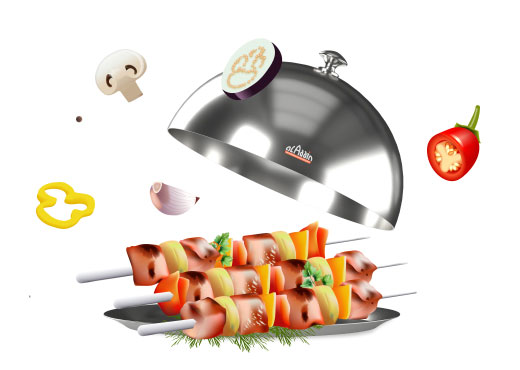The Middle East is known for its rich culinary heritage. Among its many delights are two popular dips: Hummus and Baba Ghanouj. These dips are not only delicious but also packed with nutrients. They form an integral part of the Mediterranean diet, renowned for its health benefits.
But what sets Hummus apart from Baba Ghanouj?
This article delves into the differences between these two Middle Eastern dips. We’ll explore their ingredients, preparation, nutritional value, and cultural significance.
Whether you’re a food enthusiast or looking to incorporate healthy options into your diet, this guide will provide a comprehensive understanding of Hummus and Baba Ghanouj.
Understanding Middle Eastern Dips
Middle Eastern dips are a cornerstone of the region’s cuisine. They are often served as appetizers, or ‘mezze,’ and are enjoyed with bread like Pita.
Hummus and Baba Ghanouj are two such dips that have gained global popularity. They are both plant-based, making them a favorite among vegetarians and vegans.
Hummus is a creamy dip made primarily from chickpeas and tahini. Baba Ghanouj, on the other hand, is a smoky dip made from roasted eggplant and tahini.
Despite their different main ingredients, both dips share a similar flavor profile. They are tangy, garlicky, and rich, thanks to adding lemon juice, garlic, and olive oil. These shared ingredients make them a delightful part of the Mediterranean diet, known for its heart-healthy benefits.
Hummus: A Staple of Middle Eastern Cuisine
Hummus is a beloved dish in the Middle East. Its origins trace back to ancient times, making it a significant part of the region’s culinary history. The primary ingredient in Hummus is chickpeas. These legumes are boiled until soft and then blended to a smooth paste. Tahini, a paste made from sesame seeds, is added to give Hummus its unique, nutty flavor.
Lemon juice and garlic are also added to the mix. These ingredients lend a tangy, sharp taste to the dip. Finally, a generous drizzle of olive oil gives Hummus its rich, velvety texture.
Read also: What is Hummus?
Key Ingredients and Nutritional Profile
Hummus is not only delicious but also highly nutritious. The main ingredient, chickpeas, are a great source of plant-based protein and fiber. Tahini, made from sesame seeds, is rich in healthy fats. It also provides essential vitamins and minerals, including calcium and magnesium.
Lemon juice, in addition to adding a tangy flavor, is a good source of vitamin C. Garlic, on the other hand, is known for its antimicrobial properties. Olive oil, which is used in Hummus, is a staple of the Mediterranean diet. It’s rich in heart-healthy monounsaturated fats.
The Cultural Significance of Hummus
Hummus holds a special place in Middle Eastern cuisine. It’s a common sight at family gatherings and festive occasions. In many Middle Eastern cultures, Hummus is more than just a dip. It symbolizes hospitality and generosity, and Serving It to guests is seen as a warm gesture of welcome. The popularity of Hummus has spread far beyond the Middle East. It’s enjoyed worldwide and has become a staple in many Western diets.
Preparing and Serving Hummus
Making Hummus at home is simple. All you need is a food processor and a few key ingredients. Boil the chickpeas until they’re soft. Blend the chickpeas with tahini, lemon juice, and garlic in a food processor. Drizzle in olive oil while blending until you achieve a smooth, creamy texture. Season with salt and garnish with a sprinkle of paprika or cumin. Traditionally, Hummus is served with warm pita bread. It’s also a great accompaniment to fresh vegetables, making it a healthy and versatile dip.
Baba Ghanouj: The Smoky Eggplant Dip
Baba Ghanouj is another famous Middle Eastern dip. It’s known for its smoky flavor and chunky texture. The star ingredient in Baba Ghanouj is eggplant. The eggplants are roasted until their skin is charred, giving the dip its signature smoky taste. Like Hummus, Baba Ghanouj also includes tahini, lemon juice, and garlic. These ingredients are blended with the roasted eggplant to create a flavorful dip. Olive oil is also added to Baba Ghanouj. It enhances the dip’s texture and adds a layer of richness to its flavor.
Key Ingredients and Nutritional Profile
Baba Ghanouj is a healthy food choice. The main ingredient, eggplant, is low in calories and fiber. Eggplants also contain antioxidants. These compounds help protect the body from damage by harmful molecules called free radicals. Like in Hummus, Tahini, lemon juice, and garlic contribute to Baba Ghanouj’s nutritional value. They provide essential nutrients and health benefits. Baba Ghanouj’s olive oil, rich in monounsaturated fats, contributes to heart health and is a vital component of the Mediterranean diet.
The Cultural Significance of Baba Ghanouj
Baba Ghanouj is a cherished part of Middle Eastern cuisine. It’s often served as a starter or side dish in meals. In many cultures, Baba Ghanouj is a symbol of home cooking. It’s a dish often made from scratch and shared with loved ones. Like Hummus, Baba Ghanouj has gained global popularity. It’s now a common sight in supermarkets and restaurants around the world.
Preparing and Serving Baba Ghanouj
Making Baba Ghanouj at home is a straightforward process. Here are the basic steps:
Roast the eggplants until the skin is charred and the inside is soft. Scoop out the roasted eggplant and blend it with tahini, lemon juice, and garlic. Drizzle in olive oil while blending to achieve the desired consistency. Season with salt and garnish with a sprinkle of parsley or pomegranate seeds. Baba Ghanouj is traditionally served with warm pita bread. It can also be enjoyed with fresh vegetables or spread in sandwiches.
Read also: How to Make Authentic Baba Ganoush
Hummus vs Baba Ghanouj: A Comparison
While similar in some ways, hummus and Baba Ghanouj have distinct differences. These differences lie in their ingredients, texture, flavor, and usage.
Hummus is made from chickpeas, while Baba Ghanouj is made from roasted eggplant. This difference in main ingredients leads to a difference in their nutritional profiles.
Both dips include tahini, lemon juice, garlic, and olive oil. These shared ingredients contribute to their similar flavor profiles. However, Baba Ghanouj’s smoky flavor, derived from the roasted eggplant, sets it apart from Hummus’s creamy and nutty flavor.
Texture, Flavor, and Usage
Hummus is known for its smooth and creamy texture. Baba Ghanouj, on the other hand, has a chunkier texture due to the roasted eggplant. The flavor of Hummus is nutty and slightly tangy, while Baba Ghanouj has a smoky and slightly sweet flavor. These flavors make them versatile.
Both dips can be used as spreads, in sandwiches, or for vegetables and pita bread. They can also be incorporated into various recipes, adding a touch of Middle Eastern flavor.
Health Benefits and Dietary Considerations
Both Hummus and Baba Ghanouj are considered healthy food options. They are rich in fiber, protein, and healthy fats. Hummus, being made from chickpeas, is high in protein. This makes it an excellent choice for vegetarians and vegans who need to incorporate more protein into their diets. Baba Ghanouj, made from eggplant, is low in calories and high in fiber. It also contains antioxidants, making it a good choice for those seeking a healthy diet. Both dips are part of the Mediterranean diet and are known for their health benefits. They are also gluten-free and dairy-free, making them suitable for those with dietary restrictions.
Conclusion: Embracing the Diversity of Middle Eastern Dips
In conclusion, both Hummus and Baba Ghanouj offer a unique taste of Middle Eastern cuisine. They are versatile, nutritious, and cater to various dietary needs. Whether you prefer the creamy texture of Hummus or the smoky flavor of Baba Ghanouj, both dips provide a delightful culinary experience.
Embracing these Middle Eastern dips not only broadens your palate but also introduces you to the region’s rich cultural heritage. So, the next time you want a healthy and flavorful addition to your meal, consider Hummus or Baba Ghanouj.
Read also: Explore Exquisite Hummus Options at Aladdin Mediterranean in Houston
